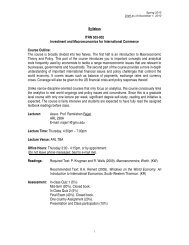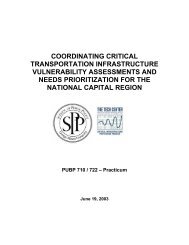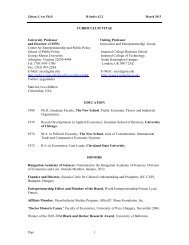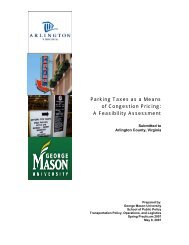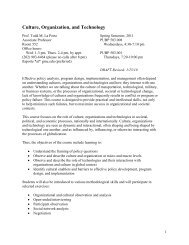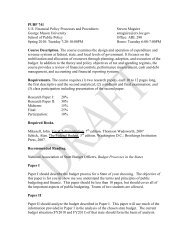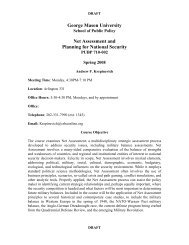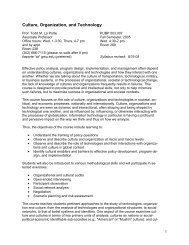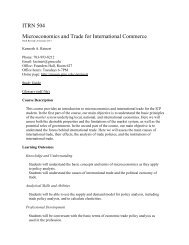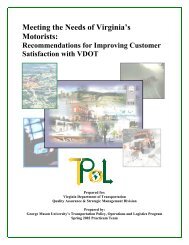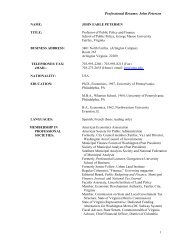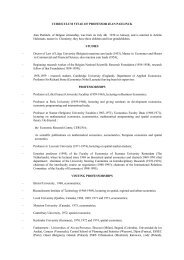Culture, Organization, and Technology - George Mason University
Culture, Organization, and Technology - George Mason University
Culture, Organization, and Technology - George Mason University
You also want an ePaper? Increase the reach of your titles
YUMPU automatically turns print PDFs into web optimized ePapers that Google loves.
<strong>Culture</strong>, <strong>Organization</strong>, <strong>and</strong> <strong>Technology</strong><br />
Prof. Todd M. La Porte<br />
Associate Professor<br />
Room 238<br />
Office hours: TBA <strong>and</strong> by appt.<br />
(202) 686-7115 (please no calls after 8 pm)<br />
tlaporte *at* gmu.edu (preferred)<br />
Spring Semester, 2009<br />
PUBP 503.007<br />
Wednesdays, 4:30-7:10 pm<br />
Room 330<br />
Revised: 10/23/08<br />
Effective policy analysis, program design, implementation, <strong>and</strong> management often depend<br />
on underst<strong>and</strong>ing cultures, organizations <strong>and</strong> technologies <strong>and</strong> how they interact with one<br />
another. Whether we are talking about the culture of transportation, technological, military,<br />
or business systems, or the processes of organizational, societal or technological change,<br />
lack of knowledge of cultures <strong>and</strong> organizations frequently results in conflict or program or<br />
policy failure. This course is designed to provide practical <strong>and</strong> intellectual skills, not only<br />
to help minimize such failures, but to maximize success in organizational <strong>and</strong> societal contexts.<br />
This course focuses on the role of culture, organizations <strong>and</strong> technologies in societal, political,<br />
<strong>and</strong> economic processes, nationally <strong>and</strong> internationally. <strong>Culture</strong>, organizations <strong>and</strong><br />
technology are seen as dynamic <strong>and</strong> interactional, often shaping <strong>and</strong> being shaped by technological<br />
one another, <strong>and</strong> as influenced by, influencing, or otherwise interacting with the<br />
processes of globalization.<br />
Thus, the objectives of the course include learning to:<br />
• Underst<strong>and</strong> the framing of policy questions<br />
• Observe <strong>and</strong> describe culture <strong>and</strong> organization at micro <strong>and</strong> macro levels<br />
• Observe <strong>and</strong> describe the role of technologies <strong>and</strong> their interactions with organizations<br />
<strong>and</strong> culture in global context<br />
• Identify cultural enablers <strong>and</strong> barriers to effective policy development, program design,<br />
<strong>and</strong> implementation<br />
Students will also be introduced to various methodological skills <strong>and</strong> will participate in selected<br />
exercises:<br />
• <strong>Organization</strong>al <strong>and</strong> cultural observation <strong>and</strong> analysis<br />
• Open-ended interviewing<br />
• Participant observation<br />
• Social network analysis<br />
• Negotiation<br />
The course teaches students pertinent approaches to the study of technologies, organization<br />
<strong>and</strong> culture, from the analysis of technologies <strong>and</strong> organizational structures, to social networks,<br />
to that of belief systems <strong>and</strong> identities.<br />
1
One aspect of the course examines culture <strong>and</strong> cultures in terms of two primary units of<br />
analysis: cultures as nations or social-political-economic identifiable sub-societies (e.g.,<br />
"American" or "Muslim" culture); <strong>and</strong> cultures as social-political-economic organizations,<br />
communities, or groups embedded or situated in national or trans-national units (e.g., the<br />
culture of digital society, of business consultants or engineers, of the FBI or the Department<br />
of Transportation).<br />
Finally, the course will give considerable attention to the dynamics between technologies,<br />
organizations <strong>and</strong> culture through a close look at how technologies underpin work <strong>and</strong> social<br />
life, how technologies shape <strong>and</strong> are shaped by organizational forces, <strong>and</strong> how technologies<br />
become embedded in national industrial, social <strong>and</strong> cultural patterns, discernable<br />
over time <strong>and</strong> space. We will address the issue of control of technology as a policy matter<br />
as well.<br />
Requirements, Grades <strong>and</strong> Examinations<br />
There are three main requirements for the course: three assignments, a final exam, <strong>and</strong><br />
participation in class discussions.<br />
Written assignments (3) 40%<br />
Mid-term writing assignment 15%<br />
Final exam 30%<br />
Participation in class discussions 15%<br />
The first assignment is to analyze the social properties of technologies by doing without for<br />
one week a technology you depend on heavily, <strong>and</strong> analyzing how a technology you hate<br />
might be improved. Individual self-observation <strong>and</strong> analysis is the focus of this assignment.<br />
The second assignment is to interview colleagues in your workplace, an organization you<br />
work in, or a school you have attended, to discover how it works, both formally <strong>and</strong> informally,<br />
how decisions are made, who has authority <strong>and</strong> how they maintain it, <strong>and</strong> what the<br />
norms are that govern the behavior of its members. Participant observation techniques will<br />
be used in this assignment, including establishing an interview protocol, negotiating permission<br />
to interview where necessary, keeping detailed interview notes, <strong>and</strong> analyzing your<br />
data to find patterns <strong>and</strong> gain insight.<br />
The final assignment is to interview a person or family that has immigrated to or emigrated<br />
from the United States. This assignment will focus on cross-cultural issues <strong>and</strong> interviewing<br />
techniques. The object is to find out what their lives were like back home, what their<br />
value system <strong>and</strong> culture were, why they left their home country, how they adapted to a<br />
new way of life, how they managed conflicts about values <strong>and</strong> culture, including those affecting<br />
their sense of self, family <strong>and</strong> place. You must choose someone from a culture <strong>and</strong><br />
continent other than your own.<br />
2
Detailed guidance about how to do these assignments will be provided in class.<br />
There will be a mid-term writing assignment on a topic to be assigned.<br />
The final will be an open-book, open-note, take-home exam. It will emphasize mastery of<br />
the materials in the cases <strong>and</strong> the readings, particularly your ability to synthesize the material<br />
<strong>and</strong> analyze cases <strong>and</strong> examples.<br />
Participation in class discussion is essential. You will be expected to review carefully in<br />
advance the material assigned for each class <strong>and</strong> be prepared to discuss it. My role in this<br />
process will be to get the discussion started, assist the class in laying out the facts of the<br />
case, pose questions, <strong>and</strong> help the class to discover general principles running through the<br />
case that might be applicable in other situations.<br />
A note on the workload: this is (I hope) a fascinating but (I know) dem<strong>and</strong>ing course.<br />
There is a larger than normal reading load, as befits a 4-credit course. Group work is<br />
strongly encouraged, at least in part as a compensating strategy (see below), though there<br />
are many other good reasons to join classmates in groups. Films <strong>and</strong> audio broadcasts are<br />
also required from time to time, <strong>and</strong> will serve to break up the readings. Previous classes<br />
have shown that the dem<strong>and</strong>s of the course are manageable, <strong>and</strong> that the material itself is<br />
compelling (time flies when the reading is good). If you have concerns about the amount<br />
of work required, please let me know.<br />
Disabilities<br />
If you are a student with a disability <strong>and</strong> you need academic accommodations, please see<br />
me <strong>and</strong> contact the Office of Disability Services (ODS) at 993-2474. All academic accommodations<br />
must be arranged through the ODS.<br />
Missed class sessions<br />
Missing class is strongly discouraged. More than two absences may jeopardize your grade.<br />
If for some reason you cannot attend a class, your participation grade can be maintained by<br />
providing me a 750-word summary <strong>and</strong> analysis of the week's reading. This is to ensure<br />
that you have dug into the material, <strong>and</strong> will therefore have less risk falling behind the rest<br />
of the class.<br />
Group work<br />
I strongly encourage you to join with students in your own study groups to discuss the<br />
material. Student contact information will be exchanged at the first session to help you get<br />
these organized.<br />
3
Student Journal<br />
I will consider nominating the very best papers in this course for publication in New Voices<br />
in Public Policy. New Voices is a student- <strong>and</strong> faculty-reviewed journal that shares SPP's<br />
finest student work with the rest of the world.<br />
Plagiarism<br />
All work must be your own. In general, where the work of others is used, even in paraphrased<br />
form, it must appropriately referenced. When in doubt, cite! Plagiarism is an Honor<br />
Code violation: http://www.gmu.edu/facstaff/h<strong>and</strong>book/aD.html<br />
Plagiarism is surprisingly confusing. For more on what it is, how to identify it, <strong>and</strong> how to<br />
avoid committing it, read the information at:<br />
http://mason.gmu.edu/~tlaporte/plagiarism.html<br />
Here follows the official SPP Policy on Plagiarism:<br />
The profession of scholarship <strong>and</strong> the intellectual life of a university as well as the field of public<br />
policy inquiry depend fundamentally on a foundation of trust. Thus any act of plagiarism strikes<br />
at the heart of the meaning of the university <strong>and</strong> the purpose of the School of Public Policy. It<br />
constitutes a serious breach of professional ethics <strong>and</strong> it is unacceptable.<br />
Plagiarism is the use of another’s words or ideas presented as one’s own. It includes, among<br />
other things, the use of specific words, ideas, or frameworks that are the product of another’s<br />
work. Honesty <strong>and</strong> thoroughness in citing sources is essential to professional accountability <strong>and</strong><br />
personal responsibility. Appropriate citation is necessary so that arguments, evidence, <strong>and</strong> claims<br />
can be critically examined.<br />
Plagiarism is wrong because of the injustice it does to the person whose ideas are stolen. But it<br />
is also wrong because it constitutes lying to one’s professional colleagues. From a prudential<br />
perspective, it is shortsighted <strong>and</strong> self-defeating, <strong>and</strong> it can ruin a professional career.<br />
The faculty of the School of Public Policy takes plagiarism seriously <strong>and</strong> has adopted a zero tolerance<br />
policy. Any plagiarized assignment will receive an automatic grade of “F.” This may<br />
lead to failure for the course, resulting in dismissal from the <strong>University</strong>. This dismissal will be<br />
noted on the student’s transcript. For foreign students who are on a university-sponsored visa<br />
(eg. F-1, J-1 or J-2), dismissal also results in the revocation of their visa.<br />
To help enforce the SPP policy on plagiarism, all written work submitted in partial fulfillment of<br />
course or degree requirements must be available in electronic form so that it can be compared<br />
with electronic databases, as well as submitted to commercial services to which the School subscribes.<br />
Faculty may at any time submit student’s work without prior permission from the student.<br />
Individual instructors may require that written work be submitted in electronic as well as<br />
printed form. The SPP policy on plagiarism is supplementary to the <strong>George</strong> <strong>Mason</strong> <strong>University</strong><br />
Honor Code; it is not intended to replace it or substitute for it.<br />
(http://www.gmu.edu/facstaff/h<strong>and</strong>book/aD.html)<br />
4
'Nuf said.<br />
Diana Hacker's A Pocket Manual of Style is the st<strong>and</strong>ard style manual in use in the School, <strong>and</strong><br />
you should become familiar with it. If you would like help with learning about how to compose<br />
your arguments or write more clearly, please contact the <strong>University</strong> Writing Center,<br />
http://writingcenter.gmu.edu, or see me.<br />
Reading List<br />
Required Books: Available in the bookstore; some also on reserve at the library circulation desk<br />
Buford, Bill, Among the Thugs, (New York: Vintage Books, 1993), ISBN: 0393033813<br />
Morgan, Gareth, Images of <strong>Organization</strong>. updated ed., (Thous<strong>and</strong> Oaks, CA: SAGE Publications,<br />
2006), ISBN: 1412939798, or any other edition<br />
Hofstede, Gert <strong>and</strong> Hofstede, Geert-Jan, <strong>Culture</strong>s <strong>and</strong> <strong>Organization</strong>s: Software of the Mind, 2 nd<br />
ed., (New York: McGraw-Hill, 2005), ISBN: 0071439595, or any other edition<br />
Blackboard<br />
Some readings will be available through Blackboard. The readings will be on Blackboard if you<br />
don’t find the readings through the Library's databases (journals or newspapers: use E-journal<br />
finder)<br />
To login to Blackboard, go to http://courses.gmu.edu<br />
Enter your GMU e-mail user name, WITHOUT the "gmu.edu". The password is your e-mail<br />
password.<br />
Course Syllabus<br />
Session 1: Introduction to the Topic <strong>and</strong> Overview of Course<br />
This section will introduce the course <strong>and</strong> its key topics. We'll talk about how the course will<br />
connect the three seemingly disparate themes, which in reality are integrated in fascinating ways.<br />
Technologies are our starting place, but the readings for this week take us into the other domains<br />
of the course as well, <strong>and</strong> indeed show that it is most fruitful to consider all three together to underst<strong>and</strong><br />
their importance to public policy. We’ll also get started thinking about assignments,<br />
class organization <strong>and</strong> requirements. Since we meet in the evening, I’ll get the ball rolling with a<br />
class snack.<br />
Volti, Rudi. (2000). Society <strong>and</strong> Technological Change, 4 th ed. (New York: Worth Publishers),<br />
chapter 1, "The nature of technology," pp. 3-16.<br />
Pacey, Arnold, The <strong>Culture</strong> of <strong>Technology</strong>, (London: MIT Press, 1983), chapter 1, pp. 1-12.<br />
5
Westrum, Ron, Technologies <strong>and</strong> Society: The Shaping of People <strong>and</strong> Things, (Belmont, CA:<br />
Wadsworth Publishing Co., 1991), chapter 1, “The shaping of people <strong>and</strong> things,” pp. 3-<br />
19.<br />
Session 2: Automobiles in America: a <strong>Technology</strong>, <strong>Organization</strong> <strong>and</strong> <strong>Culture</strong> Paradigm<br />
This session starts out with a close look at one of the most influential <strong>and</strong> powerful technologies<br />
the world has ever known: the gas-powered, internal combustion automobile. Called “the machine<br />
that changed the world,” automobiles are an ideal vehicle (excuse the pun) for looking at a<br />
technical system in all its technological, organizational, political, economic <strong>and</strong> cultural glory.<br />
But studying automobiles in this way is not just an end in itself. It is also a paradigm for looking<br />
at any large technological system, in any society <strong>and</strong> level of development.<br />
“White Heat: Beat of the System,” BBC, 1994. Available at:<br />
http://www.youtube.com/watch?v=JgvYGi5J-Cg,<br />
“Ford <strong>and</strong> Taylor in the 1920s”<br />
Part One: http://www.youtube.com/watch?v=PvbG9Sjp97o&feature=related<br />
Part Two: http://www.youtube.com/watch?v=PvbG9Sjp97o&feature=related<br />
“Working at Ford in the 1920s,”<br />
Part one: http://www.youtube.com/watch?v=QtYRLtT8bvY&feature=related<br />
Part two: http://www.youtube.com/watch?v=1Re-yUnO-Hk&feature=related<br />
Meyer, Stephen, “Labor,” <strong>and</strong> Melosi, Martin V., “Environment,” documents on website<br />
Automobile in American Life <strong>and</strong> Society, <strong>University</strong> of Michigan, Dearborn <strong>and</strong> Benson<br />
Ford Research Center, 2004.<br />
Available at: http://www.autolife.umd.umich.edu/ (with photos <strong>and</strong> additional material on<br />
design, gender, <strong>and</strong> race) or in Word documents (without photos) on Blackboard).<br />
McShane, Clay, Down the Asphalt Path: The Automobile <strong>and</strong> the American City, (New York:<br />
Columbia <strong>University</strong> Press, 1994), chapter 8, “Gender wars,” pp. 149-171.<br />
Gladwell, Malcolm, “Big <strong>and</strong> Bad: How the S.U.V. Ran Over Automotive Safety,” The New<br />
Yorker, January 12, 2004, pp. 28-33. Available at:<br />
http://www.gladwell.com/2004/2004_01_12_a_suv.html<br />
Session 3: <strong>Technology</strong> Choices, Sponsors <strong>and</strong> the Development of Technological Systems<br />
This session will introduce technology as a social, organizational <strong>and</strong> cultural phenomenon, beginning<br />
with some definitions, <strong>and</strong> situating the concept in historical context. Technologies are<br />
often seen as purely physical or instrumental things, <strong>and</strong> they are certainly that. But an exp<strong>and</strong>ed<br />
view of technology shows that it provides the underpinnings of not only economic, but also social<br />
<strong>and</strong> cultural life, <strong>and</strong> that technologies both shape, <strong>and</strong> are shaped by, non-technological factors.<br />
6
Westrum, Ron, Technologies <strong>and</strong> Society: The Shaping of People <strong>and</strong> Things, (Belmont, CA:<br />
Wadsworth Publishing Co., 1991), chapter 9, “The sponsorship of technology,” pp. 171-<br />
193.<br />
Kirsch, David, “Industrial ecology <strong>and</strong> the future of the automobile: large-scale technological<br />
systems, technological choice, <strong>and</strong> public policy,” chapter 8 in The Electric Vehicle <strong>and</strong><br />
the Burden of History, New Brunswick, NJ: Rutgers <strong>University</strong> Press, 2000), pp. 228-<br />
237.<br />
Who Killed the Electric Car? Chris Paine, director, Sony Pictures Home Entertainment, 2006.<br />
Cowan, Ruth Schwartz, “How the refrigerator got its hum,” in The Social Shaping of <strong>Technology</strong>:<br />
How the Refrigerator Got Its Hum, Donald MacKenzie <strong>and</strong> Judy Wajcman, eds.,<br />
(Milton Keynes: Open <strong>University</strong> Press, 1985), pp. 202-218.<br />
Fallows, James, “The American Army <strong>and</strong> the M-16 rifle,” chapter 6 in The Social Shaping of<br />
<strong>Technology</strong>, 2 nd ed., (Buckingham: Open <strong>University</strong> Press, 1999), pp. 382-394.<br />
Session 4: <strong>Technology</strong> <strong>and</strong> Progress<br />
Thinking about technology means thinking about progress. Most people have no doubt that<br />
technology is good, <strong>and</strong> that more is better. It almost goes without saying that innovation <strong>and</strong><br />
economic growth based on technological development has meant rising material welfare, <strong>and</strong><br />
greater national economic, political <strong>and</strong> military power. The evidence of the truth of this is apparent<br />
all around us.<br />
But this conventional assessment is also superficial. There is a lot more going on in how people<br />
<strong>and</strong> technologies interact, <strong>and</strong> in how people think of them. The very idea of progress has undergone<br />
significant change, <strong>and</strong> will continue to evolve. In addition, technological changes in<br />
the workplace will affect nearly everyone, <strong>and</strong> the pace of this change is picking up. So, how<br />
should we think about technological change? To benefits through such changes? Does technology<br />
have a “dark side?” What do people do about technology-based challenges to their livelihoods<br />
<strong>and</strong> ways of life? It will help if we look at technology not as a bunch of hardware, but as<br />
social, economic <strong>and</strong> political phenomena. A series of short historical cases will help illustrate<br />
the power of this approach.<br />
Marx, Leo, “Does improved technology mean progress?” <strong>Technology</strong> Review, vol. 90, Jan. 1987,<br />
p. 32+.<br />
Brown, <strong>George</strong> E., Jr., “<strong>Technology</strong>'s dark side,” The Chronicle of Higher Education, vol. 39,<br />
issue 43, June 30, 1993, p. B1.<br />
Volti, Rudi. (2000). Society <strong>and</strong> Technological Change, 4 th ed. (New York: Worth Publishers),<br />
chapter 2, "Winners <strong>and</strong> losers," pp. 17-32.<br />
7
Schumacher, E. F., “Buddhist economics,” in <strong>Technology</strong> <strong>and</strong> the Future, Al Teich, ed., 7 th ed.<br />
(Belmont, CA: Wadsworth/Thomson, 1993), pp. 231-238. Excerpt originally published<br />
in Schumacher, E. F., Small is Beautiful: Economics As If People Mattered, (New York:<br />
Harper Collins, 1973).<br />
Winner, Langdon, “Look out for Luddites,” <strong>Technology</strong> Review, November/December 1997, p.<br />
62.<br />
Examples:<br />
Halstead, Ted, “American paradox: the country with the most patents, Nobel laureates, <strong>and</strong> millionaires<br />
is also the country with the highest levels of poverty, homicide <strong>and</strong> infant mortality,”<br />
The Atlantic Monthly, vol. 291, issue 1, Jan/Feb. 2003, pp. 123-125.<br />
Kapur, Akash, “Poor but prosperous: development <strong>and</strong> quality of life can't always be measured<br />
purely in economic terms. The Indian state of Kerala is a case in point,” The Atlantic<br />
Monthly, vol. 282, issue 3, Sept. 1998, pp. 40, 42+.<br />
Berry, Wendell, “Why I am not going to buy a computer,” in <strong>Technology</strong> <strong>and</strong> the Future, Al<br />
Teich, ed., 9 th ed. (Belmont, CA: Wadsworth/Thomson, 2003), pp. 31-36. Originally<br />
published in What Are People For? in 1990. Available at:<br />
http://www.tipiglen.dircon.co.uk/berrynot.html<br />
Session 5: Controlling Technologies: Ethics, Risk <strong>and</strong> Democracy<br />
In this session, we move from a discussion about underst<strong>and</strong>ing technologies as they affect individuals,<br />
organizations, society <strong>and</strong> cultures, to one about controlling them. In so doing, we will<br />
learn ways to reduce the likelihood that technologies will result in harm to, or so that they will<br />
function in ways more consistent with norms of democratic societies. Technological controversies<br />
suggest that the interests of technology designers <strong>and</strong> promoters are out of alignment with<br />
the interests of at least part of the public, but controversies can also provide the means for technology<br />
designers to incorporate feedback.<br />
Winner, Langdon, “Do artifacts have politics?” in The Whale <strong>and</strong> the Reactor (Chicago: <strong>University</strong><br />
of Chicago Press, 1986), pp. 19-39. Available at:<br />
http://www-personal.si.umich.edu/~rfrost/courses/Women+Tech/readings/Winner.html<br />
or http://www.courses.psu.edu/phil/phil403_pam208/winner/19.html<br />
Nelkin, Dorothy, “Science, technology, <strong>and</strong> political conflict: analyzing the issues,” in Controversy:<br />
Politics of Technical Decisions, Dorothy Nelkin, ed., (Beverly Hills, CA; SAGE<br />
Publications, 1979), pp. 9-22.<br />
Giddens, Anthony, “Risk,” Runaway World, (New York: Routledge, 2000), pp. 38-53.<br />
Jonas, Hans, “<strong>Technology</strong> <strong>and</strong> responsibility: reflections on the new tasks of ethics,” Social Research,<br />
vol. 40, no. 1, Spring 1973, pp. 3l-54.<br />
8
Westrum, Ron, Technologies <strong>and</strong> Society: The Shaping of People <strong>and</strong> Things, (Belmont, CA:<br />
Wadsworth Publishing Co., 1991), chapter 15, “Social control of technologies,” pp. 293-<br />
322, <strong>and</strong> chapter 17, “Foresight <strong>and</strong> intelligence,” pp. 353-380.<br />
Volti, Rudi. (2000). Society <strong>and</strong> Technological Change, 4 th ed. (New York: Worth Publishers),<br />
chapter 17, “Governing technology,” pp. 294-310.<br />
Session 6: Language, Politics <strong>and</strong> <strong>Culture</strong><br />
Language shapes what we think <strong>and</strong> believe in, <strong>and</strong> how we act. The words <strong>and</strong> metaphors we<br />
use to think <strong>and</strong> communicate can shape how we perceive the world, <strong>and</strong> thereby enable or constrain<br />
certain types of action. They also may contain hints of individuals' moral foundations,<br />
which in turn can affect policy <strong>and</strong> culture. At the same time, the production <strong>and</strong> dissemination<br />
of language in mass society, both totalitarian <strong>and</strong> liberal-democratic, has changed profoundly<br />
during the industrial era. This session will look at language <strong>and</strong> politics, <strong>and</strong> examine some of<br />
the institutional features that shape their use <strong>and</strong> development.<br />
With these readings, we set the stage for underst<strong>and</strong>ing how advertising <strong>and</strong> public relations<br />
emerged as ways to manage society in the early 20th century, as the productive power of industry<br />
began to create tremendous economic <strong>and</strong> social changes in industrializing societies. Central<br />
to this story is Edward Bernays, the founder of modern public relations <strong>and</strong> advertising, <strong>and</strong> a<br />
nephew of Sigmund Freud.<br />
Curtis, Adam, Century of the Self, British Broadcasting Corporation/Channel Four documentary,<br />
London: RDF International, 2006, 2002. Available for online viewing at:<br />
http://www.archive.org/details/AdaCurtisCenturyoftheSelf_0<br />
Ewen, Stuart, Captains of Consciousness, (New York: McGraw-Hill, 1976), pp. 3-39.<br />
Pollay, Richard W., "Propag<strong>and</strong>a, puffing <strong>and</strong> the public interest,” Public Relations Review, vol.<br />
16, 1990, pp. 39-54. Available at:<br />
http://legacy.library.ucsf.edu/cgi/getdoc?tid=zkh84c00&fmt=pdf&ref=results<br />
Lakoff, <strong>George</strong>, Moral Politics: How Liberals <strong>and</strong> Conservatives Think, 2 nd ed., (Chicago: Univ.<br />
of Chicago Press, 1996, 2002), chapter 2, "The worldview problem for American politics,"<br />
pp. 24-37, <strong>and</strong> chapter 10, "Social programs <strong>and</strong> taxes," pp. 179-196.<br />
Suggested viewing <strong>and</strong> reading:<br />
1984, Michael Radford, director, from the novel by <strong>George</strong> Orwell, Virgin Films, 2003. Available<br />
at: http://video.google.com/videoplay?docid=-<br />
5464625623984168940&ei=DvXiSLTuKZLAqAKT--XFBw&q=google+1984+orwell<br />
-or-<br />
Orwell, <strong>George</strong>, 1984, (London : Secker & Warburg, 1949), chapters 1-4. Available at:<br />
http://www.mondopolitico.com/library/1984/1984.htm<br />
9
PBS Frontline: “The persuaders,” Douglas Rushkoff, correspondent, November 9, 2004, chapter<br />
5, “Give us what we want.” Available at:<br />
http://www.pbs.org/wgbh/pages/frontline/shows/persuaders/<br />
Luntz, Frank, “The environment: a cleaner, safer, healthier America,” The Luntz Companies:<br />
Straight Talk, research memo, pp. 131-146. Available at:<br />
http://www2.bc.edu/~plater/Newpublicsite06/suppmats/02.6.pdf<br />
Session 7: How to Find Out What’s Going On with People: Varieties of Ethnographic Methods<br />
In this session we’ll explore the various ways that students of organizations, society <strong>and</strong> culture<br />
come to underst<strong>and</strong> what is going on in the messy human reality “out there.”<br />
Kitchen Story, Bent Hamer, director, MGM Entertainment, 2004.<br />
Geertz, Clifford, “Thick description: toward an interpretive theory of culture,” chapter 1 in The<br />
Interpretation of <strong>Culture</strong>s, (New York: Basic Books, 1974), pp. 3-30.<br />
Schutt, R. K., “Qualitative methods: observing, participating, listening,” chapter 8 in Investigating<br />
the Social World: The Process <strong>and</strong> Practice of Social Research, 3rd ed., (Thous<strong>and</strong><br />
Oaks, CA: Pine Forge Press, 2001), pp. 263-325.<br />
Lahiri, Jhumpa, “Mrs. Sen’s,” Interpreter of Maladies, (New York: Houghton Mifflin, 1999),<br />
pp. 111-135.<br />
Buford, Bill, Among the Thugs, (New York: Vintage Books, 1993), part I, pp. 9-126.<br />
“Shouting Across the Divide,” This American Life, episode 322, December 15, 2006. Available<br />
at: http://www.thisamericanlife.org/Radio_Episode.aspx?sched=1163<br />
Suggested Films:<br />
Head On, Fatih Akin, writer, director, Bavaria Film International, Str<strong>and</strong> Releasing Home Video,<br />
2005.<br />
The Namesake, Mira Nair, director, from the novel by Jhumpa Lahiri, Fox Searchlight Pictures,<br />
2006.<br />
Session 8: <strong>Organization</strong>s: From Simple to Complex, <strong>and</strong> the Search for Rationality<br />
Human life is so entangled with organizations that we hardly notice them – except that we notice<br />
them literally all the time. In many respects, they co-evolved with large-scale industry <strong>and</strong> technology.<br />
Yet taking a few steps back <strong>and</strong> seeing what organizations really are, what they do, <strong>and</strong><br />
how they operate is critical for being able to work effectively with them. This session will sharpen<br />
our underst<strong>and</strong>ing of organizations by introducing us to several perspectives on them, each<br />
with its own consequences for personal satisfaction, economic success <strong>and</strong> social power. We’ll<br />
also connect technologies to organizational structure <strong>and</strong> change, particularly in terms of ratio-<br />
10
nality <strong>and</strong> organizations’ efforts to control the factors of uncertainty, both in <strong>and</strong> outside organizational<br />
boundaries.<br />
Morgan, Gareth, Images of <strong>Organization</strong>. 2 nd ed., (Thous<strong>and</strong> Oaks, CA: SAGE Publications,<br />
1997),<br />
chapter 1, “Introduction,” pp. 3-8,<br />
chapter 2, "Mechanization takes comm<strong>and</strong>: organizations as machines," pp. 11-31, chapter<br />
3, "Nature intervenes: organizations as organisms," pp. 32-71.<br />
Elwell, Frank, “The sociology of Max Weber,” Rogers State <strong>University</strong>, unpublished text.<br />
Taylor, Fredrick W., The Principles of Scientific Management (excerpt), 1911.<br />
Ritzer, <strong>George</strong>, The McDonaldization of Society, (Pine Forge Press, 1993), chapter 1, pp. 1-17.<br />
Session 9: <strong>Organization</strong>s: <strong>Culture</strong>, Politics <strong>and</strong> <strong>Organization</strong>al Analysis<br />
This session will continue our examination of organizations, focusing on learning, culture <strong>and</strong><br />
politics in organizational life. Building on last week’s discussion of contingency theory, we will<br />
look at how some organizations come to possess the capacity to learn continuously as they grapple<br />
with rapid <strong>and</strong> unpredictable change. In addition, all organizations have cultures that shape<br />
the social reality that staff <strong>and</strong> managers function in. In addition, organizations are inherently<br />
political <strong>and</strong> the participants are all political actors, whether they like it or not. This session will<br />
address these two important aspects in some detail.<br />
Bozeman, Barry, All <strong>Organization</strong>s Are Public: Bridging Public <strong>and</strong> Private <strong>Organization</strong>al<br />
Theories, (San Francisco: Jossey-Bass Publishers, 1987), chapter 6, “Why all organizations<br />
are public,” pp. 83-106.<br />
Morgan, Gareth, Images of <strong>Organization</strong>. 2 nd ed., (Thous<strong>and</strong> Oaks, CA: SAGE Publications,<br />
1997),<br />
chapter 4, “Learning <strong>and</strong> self-organization: organizations as brains,” pp. 73-118.<br />
chapter 5, “Creating social reality: organizations as cultures,” pp. 119-152,<br />
Session 10: <strong>Organization</strong>s, Domination <strong>and</strong> Power<br />
An important aspect of organizations is their operating style or culture, which in many cases can<br />
be the source of great strength <strong>and</strong> success, or sometimes of serious trouble or problems, even<br />
failure. This session introduces us to the concept of organizational culture from a management<br />
perspective. Underst<strong>and</strong>ing how organizations work in practical terms, <strong>and</strong> how to diagnose<br />
their problems, is important for staff <strong>and</strong> management in any organization, in any setting.<br />
Achbar, Mark, Jennifer Abbott <strong>and</strong> Joel Bakan, The Corporation, Big Picture Media Corp. <strong>and</strong><br />
TV Ontario, 2004. Available for online viewing at:<br />
http://www.youtube.com/watch?v=Pin8fbdGV9Y (by chapters, medium resolution) or<br />
http://informationclearinghouse.info/article12998.htm (entire film, low resolution)<br />
11
Morgan, Gareth, Images of <strong>Organization</strong>. 2 nd ed., (Thous<strong>and</strong> Oaks, CA: SAGE Publications,<br />
1997),<br />
chapter 6, “Interests, conflict <strong>and</strong> power: organizations as political systems,” pp. 153-<br />
214,<br />
chapter 7, “Exploring Plato’s cave: organizations as psychic prisons,” pp. 215-249,<br />
chapter 9, “The ugly face: organizations as instruments of domination,” pp. 301-346.<br />
Session 11: Social Networks <strong>and</strong> Social Capital<br />
In this session, we'll discuss the basic tools of social network analysis, <strong>and</strong> how they can be applied.<br />
Our main focus will be networks within <strong>and</strong> between organizations, communities, groups,<br />
institutions, <strong>and</strong> nations.<br />
Goetz, Kristina, “New teen study could help stop spread of sexually transmitted disease,” Columbia<br />
News Service, March 15, 2005. Available at:<br />
http://jscms.jrn.columbia.edu/cns/2005-03-15/goetz-teensex/<br />
Brooks, David, “The Social Animal,” New York Times, Sept. 12, 2008, p. A23. Available at:<br />
http://www.nytimes.com/2008/09/12/opinion/12brooks.html<br />
Granovetter, Mark, “The strength of weak ties.” American Journal of Sociology vol. 78, no. 6,<br />
1973, pp. 1360-80.<br />
Watts, Duncan, "Decentralized intelligence." Slate, 2004. Available at:<br />
http://www.slate.com/id/2104808/<br />
Sageman, Marc?<br />
Putnam, Robert, “Bowling Alone: America’s Declining Social Capital,” Journal of Democracy,<br />
vol. 6, no. 1, January 1995, pp. 65-78. See also the figures from Putnam’s book, Bowling<br />
Alone on Blackboard.<br />
Castells, Manuel, “Prologue,” in Rise of the Network Society, (London: Blackwell Publishers,<br />
1996, pp. 1-13.<br />
12
Session 12: <strong>Culture</strong>s, Values <strong>and</strong> Civilizations<br />
This session will take up the question of the role values that may underlie the many of ways nations<br />
are organized politically <strong>and</strong> economically, <strong>and</strong> the role of values <strong>and</strong> norms, <strong>and</strong> of organizations<br />
<strong>and</strong> institutions in establishing <strong>and</strong> sustaining these systems. The question of culture<br />
change, <strong>and</strong> culture's relationship to democracy will also be discussed. Finally, the session is<br />
also about qualitative <strong>and</strong> quantitative methods of measuring or assessing culture, <strong>and</strong> an introduction<br />
to two large-scale survey projects <strong>and</strong> their results.<br />
Griswold, Wendy, “<strong>Culture</strong> <strong>and</strong> the cultural diamond,” chapter 1 <strong>and</strong> “<strong>Culture</strong> <strong>and</strong> organization:<br />
getting things done in a multicultural world,” chapter 6, in <strong>Culture</strong>s <strong>and</strong> Societies in a<br />
Changing World, (Pine Forge Press, 1994), pp. 1-17, pp. 116-137.<br />
Hofstede, Gert <strong>and</strong> Hofstede, Geert-Jan, <strong>Culture</strong>s <strong>and</strong> <strong>Organization</strong>s: Software of the Mind, 2 nd<br />
ed., (New York: McGraw-Hill, 2005).<br />
Inglehart, Ronald, “Globalization <strong>and</strong> post-materialist values,” Washington Quarterly, vol. 23,<br />
no. 1, Winter 2000, pp. 215-228. Available at:<br />
http://www.twq.com/winter00/231Inglehart.pdf<br />
Inglehart, Ronald <strong>and</strong> Norris, Pippa, “The true clash of civilizations,” Foreign Affairs, vol. 82,<br />
no. 2, March/April 2003, pp. 67-74. Available at:<br />
http://www.globalpolicy.org/globaliz/cultural/2003/0304clash.htm<br />
Session 13: <strong>Culture</strong> <strong>and</strong> Economic Development<br />
Anthropologists have been studying cultures for decades, <strong>and</strong> have developed deep underst<strong>and</strong>ing<br />
of how they work by seeing them from the inside <strong>and</strong> from close up. Such approaches emphasize<br />
such concepts as roles, authority structures, formal <strong>and</strong> informal rules, beliefs, rituals,<br />
<strong>and</strong> the like. Such ethnographic accounts strive to make no value judgments, but some have criticized<br />
practitioners for bending too far backward to defend a culture even when it violates certain<br />
basic human rights, such as ritual murder, genital mutilation, slavery, <strong>and</strong> the like. The issue has<br />
long been debated in anthropological circles, <strong>and</strong> is today still not resolved.<br />
A recent str<strong>and</strong> of thinking (or rather a reworking of an older tradition) holds that culture may<br />
account for economic failure in many countries in Africa, Latin America <strong>and</strong> parts of Asia. Authors<br />
in this school want to explain, <strong>and</strong> to change, such cultural elements to improve economic<br />
<strong>and</strong> social well-being. At the same time, an equally venerable tradition in comparative political<br />
studies holds that the United States possesses a number of truly exceptional characteristics,<br />
which together make the country both a beacon for economic growth <strong>and</strong> personal freedom, but<br />
also the locus of extraordinary crime, social mayhem, <strong>and</strong> inequality. The following chapters,<br />
several taken from the edited volume of a symposium at Harvard <strong>University</strong> in 1998, <strong>Culture</strong><br />
Matters, (New York: MIT Press, 2004), provide a starting point for our own discussion of what<br />
culture is, <strong>and</strong> how <strong>and</strong> why it matters in public policy.<br />
13
Lipset, Seymour Martin, “Economy, religion <strong>and</strong> welfare,” in American Exceptionalism: A<br />
Double-Edged Sword, (New York: W. W. Norton, 1196), pp. 53-76.<br />
L<strong>and</strong>es, David, “<strong>Culture</strong> makes almost all the difference,” chapter 1 in <strong>Culture</strong> Matters, (New<br />
York: MIT Press, 2004), pp. 2-13.<br />
Etounga-Manguelle, Daniel, “Does Africa need a cultural adjustment program?” chapter 6 in<br />
<strong>Culture</strong> Matters, (New York: MIT Press, 2004), pp. 65-77.<br />
Shweder, Richard A., “Moral maps, “First World” conceits, <strong>and</strong> the new evangelists,” chapter 12<br />
in <strong>Culture</strong> Matters, (New York: MIT Press, 2004), pp. 158-176.<br />
Session 14: Civilizations, Contact <strong>and</strong> Conflict<br />
Conflicts over fundamental values can lead to polarized positions, sometimes with dramatic <strong>and</strong><br />
tragic results, as we have recently seen with the September 11 th attack <strong>and</strong> Middle Eastern politics,<br />
from Israel <strong>and</strong> Palestine to Iraq, Iran, Afghanistan, <strong>and</strong> beyond. Regrettably, these are no<br />
longer extreme cases. They point the urgent need for much greater cultural sensitivity if they are<br />
to be solved, <strong>and</strong> if more such conflicts are to be avoided. How much of this conflict is due to<br />
forces of economic <strong>and</strong> technological change <strong>and</strong> modernization? What might have been done to<br />
minimize the chances of a destructive outcome? We will dip a toe into these roiling waters with a<br />
discussion of “Muslim rage” <strong>and</strong> revisit the clash of civilizations argument of Samuel Huntington.<br />
Rohde, David, “Army Enlists Anthropology in War Zones,” New York Times, October 5, 2007.<br />
Lewis, Bernard, “The roots of Muslim rage.” Atlantic Monthly, vol. 266, no. 3, September 1990,<br />
pp. 47-60,<br />
http://www.sullivan-county.com/id3/lewis1.htm part 1<br />
http://www.sullivan-county.com/id3/lewis2.htm part 2<br />
Said, Edward, "Islam through Western eyes," The Nation, April 26, 1980,<br />
http://www.thenation.com/docprint.mhtml?i=19800426&s=19800426said<br />
Atran, Scott, "Mish<strong>and</strong>ling suicide terrorism," The Washington Quarterly, vol. 27, no. 3, Summer<br />
2004, pp. 67–90.<br />
Ahmed, Akbar, Journey Into Islam: The Crisis of Globalization, (Washington: Brookings Institution<br />
Press, 2007). Review in Christian Science Monitor, April 19:<br />
http://www.csmonitor.com/2007/0419/p13s02-lire.htm<br />
Take-home final exam<br />
14



